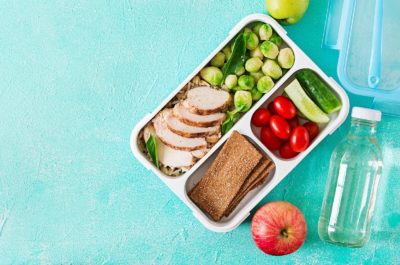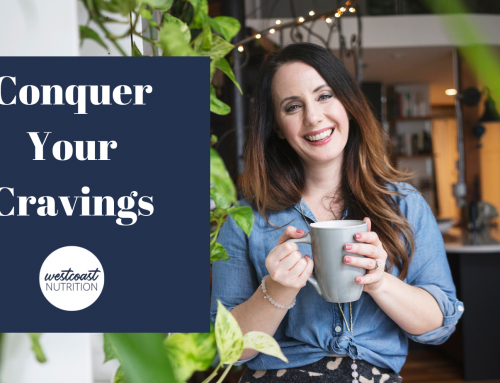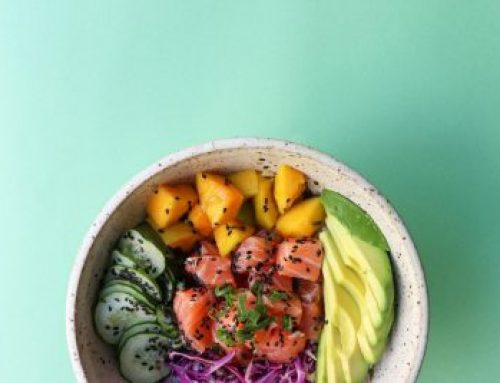The macros diet, should you try it? Our run downs of popular diets have been one of our most loved posts – I’m pumped to talk to you about what “macros” diets are, who they might be good for, and where they miss the mark.
What is the macros diet?
Macronutrients are calorie providing nutrients; protein, fat and carbohydrates. As vitamins and minerals don’t provide any calories, they aren’t taken into account on a macros diet.
The diet is essentially calorie counting plus a layer. Your total calories for each day are divided up between the “macros” – your carbs, fats and proteins. This isn’t new. “Macro” ranges for healthy people have been set by health care professionals through the Acceptable Macronutrient Distribution Range (AMDR). What macros you are provided or have calculated for you should depend on your goals, age, health history and activity but this isn’t the case with many online calculators, “macros meal plans” or personal trainers. If you look at the AMDR below, you can see the ranges are quite broad. While it works as a general public health guideline, it isn’t something I use with most of my clients. Part of the magic of nutrition is personalizing it to see the best benefit.
AMDR:
20-35% Fats
10-35% Proteins
45-65% carbohydrates
What are the benefits of the macros diet?
For those who haven’t done much tracking in the past, tracking your food in an app and comparing them to a set range allows you to see what your usual foods “cost” in terms of calories and what nutrients they are made up of. This can be a huge benefit if you aren’t already familiar. Take peas, corn and carrots for example – these are healthy foods but much higher in carbs than many other vegetables. So having a sense of where they “fit” may help you reach your goal whether that’s more carbs to fuel long runs, or less to support better blood sugar.
My favourite app for tracking is Cronometer.
I find it easy to use, and it can show you your data over a week or month so you can see how you’re doing in a more big picture way. This is helpful if you tend to get caught up in micromanaging day to day.
Tracking your macros may also help you be more mindful of gaps in your usual eating style if you notice you are consistently low on protein, it’s much easier to strategize and find ways to get more.
As far as physical benefits, that is going to depend greatly on what “macros” you have set and how they compare to your goals. If you get on a really high carb plan but have low activity and are in your 30’s and 40’s, you’re likely going to see fat gain (not loss) but something more moderate that includes more filling fats and proteins may work really well. Before you pay for someone to “do your macros” ask lots of questions about what information they take into account to ensure they are personalizing more than just the calories.
Are there downsides to macros?
Yes. Like all diets, macros comes with some major gaps. It’s not a dangerous diet in and of itself, we saw that for some it can build awareness and mindfulness of what your food is made up of. It also leaves out some of the most important parts of building a high quality way of eating to reach your health goals.
By nature, macros doesn’t take into account key anti-inflammatory nutrients that are needed for everything from fat loss to digestive healing. I’ve seen clients come in on a macros meal plan feeling lethargic, grinding through workouts, and feeling totally stuck because they were missing vitamins, minerals, fibre and REAL FOOD. The desire to make foods perfectly fit your macros can often leave you drinking lots of shakes, eating lots of bars and relying on supplements to try and fit in that narrow little box. The reality is that supplementation can not fix a bad diet. They should be the icing, not the cake!
Vitamins and minerals:
While they don’t provide any calories, vitamins and minerals are required in every single chemical reaction in our body. From breaking fat down for energy, to ramping up an anti-inflammatory pathway, to regulating our thyroid, and keeping our brain and nervous system balanced. Skimping on these guys will halt your progress eventually. Where do these come from? Real foods. Veggies, whole grains, meat, fish, poultry, eggs, beans and legumes….all these whole foods offer more than just calories and if you’re following a macros plan make sure you’re still hitting 6-10 cups of veggies per day and no more than one “shake/powdered” protein meal.
Fibre:
This unsexy nutrient does more than make you poop regularly (although, it is key for that). Fibre both stimulates your gut walls to move things along, but also feeds your healthy gut bacteria. This is a key step in the anti-inflammatory chain, as having more good gut bacteria lowers inflammation at the gut level and thus keeps that systemic stress response lower as well. Think you’re covered because you have Metamucil? Think again. Our good gut bacteria require a variety of fibres from real whole foods for best effect. Metamucil might keep you pooping, but it won’t give you the most bang for your buck.
Who should absolutely not follow a “macros” diet?
If you have a history (even remote) of disordered eating, food restriction that causes anxiety or overeating, or think about food constantly you should not track calories or macros. The increased focus on the details is a common trigger for a resurgence of those damaging habits. Work with someone who can help you eat well and find the right balance using a tool that will also heal that dysfunctional relationship with food and dieting. You’re worth the time and effort it takes to find a more sustainable and enjoyable workaround.
Final words:
Tracking your macros can be a very useful short term tool for many to build awareness! But you need to also work on ensuring food quality is good, and addressing any underlying practical challenges like emotional eating, planning, or personal health challenges (gut, thyroid, stress) for any results to stick long term. I hope this cements that there is no one perfect diet, your job is to find what works really well for you, and is enjoyable enough to sustain for years.
Need some help getting your meals for the week balanced and prepared? If you’d like to receive our free Meal Planning Getting Started Guide AND get in on our weekly emails about all things nutrition so you can get clarity and confidence on what you’re eating, join us here!





